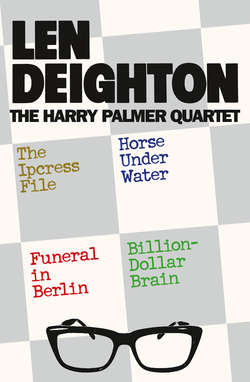Читать книгу The Harry Palmer Quartet - Len Deighton - Страница 23
12
ОглавлениеAcacia Drive was a wide wet street in one of those districts where the suburbs creep stealthily in towards Central London. The soot-caked hedges loomed almost as high as the puny trees encased in their iron cages. Here and there a dirty net curtain let a glimmer from a 40-watt bulb escape to join the feeble street lighting.
We waited while the last two men got into position. A door opened somewhere down the street, firing a yellow shaft of light into the gloom. A man in a cloth cap pulled a silver fabric cover from a shrouded car. It proved to be not the one he was looking for. He lifted the silver skirt of the next car. The third one had the right number plate. He drove it off down the street which now became a dark and silent car mortuary once more.
No. 42 had two gates joined by a semicircular driveway of crunchy gravel. On the top floor one very small window showed a light. The Champ vehicle was nearer to the house than any of the private cars the police had used. In the back seat the military policeman was listening to the radio sets of the plainclothes men positioning themselves in the back garden. He gave us the high sign with thumb touching forefinger. Murray and I decided to force a window at the side of the house. The MP was to talk out a description of signals we gave him by torch. Murray had the jemmy and I had a sheet of brown paper covered with police canteen golden syrup.
The gravel crunched underfoot and an aeroplane winking coloured lights vibrated against the cloud. It had almost stopped raining, but the house shone wetly. The grounds were extensive and once across the path we plunged into the kitchen garden that lay alongside the house. The soles of my feet began to squelch as the soaked long grass sprinkled my legs, trousers and socks. We paused alongside the greenhouse through which the moon played shadow games, making mythical monsters of pots and beans and flowers. Every few seconds the house changed character, at one time menacing and sinister, and again the innocent abode of law-abiding citizens about to be attacked by my private army. The luminous watch said 9.11. Over the far side of the grounds I saw a movement by one of the policemen. The wind had dropped and now the aircraft had passed over it seemed very quiet and still. In the distance I heard a train. I stood there unhappily, my feet were wet and made little sucking sounds. I felt Murray touch my elbow with the cold metal jemmy. Looking round I found him pretending it was an accident. I took the hint. The side window was higher than it had looked from the road. Reaching up with the sticky brown paper I smoothed it across the glass and a little syrup ran down my wrist. Murray stuck the jemmy into the woodwork, but it was locked right enough. The window to the left was barred, so he hit the brown-paper-covered pane with the iron. A muffled syrupy crunch and then the broken glass fell inwards hinged on the brown paper. Murray was groping for the fastenings as we did a Charleston in slow motion on the flower-bed. The window swung open and Murray dived head first through. I saw the soles of his hand-made shoes (eighteen guineas) with a small sticky rectangular price tab still affixed under the instep. I passed the army pistol into his hand and followed.
The moonlight poked a finger into a small lounge; the furniture old and comfortable; the fireplace held an electric fire with plastic logs; and scattered across the sofa was some clothing. Suddenly a clock chimed loudly. Murray was out in the hallway. Down the staircase someone had dropped sheets of blue lined writing paper. I knew that the house was empty, but we continued to creep around until 9.28.
Except for a couple to look after the house, the policemen had all been packed off in the cars. The gambling party, we told them, had been cancelled at the last minute. Murray and I went down the road for a cup of ‘coffee’ in one of the Espresso palaces – rubber plants and buns to match. A sour-faced young waitress flung a smelly dishcloth around the table, said ‘Two cappercheeny,’ then went back to the three young men in black imitation-leather jackets and jeans, with genuine rivets, for a conversation about motor cycles.
